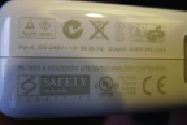Travel Reference
In-Depth Information
Guide to Using Electronics in Europe
There is no doubt that electronics play a huge part in our lives, so it is no surprise that
electronics have become an essential part of travel. Between smartphones, digital cameras,
laptops, e-books, video cameras, blow-dryers, and hair straighteners, the choice of what elec-
tronics to pack can get overwhelming. This section will not only explain what electronics are
available, but also how to make sure they survive the trip overseas.
EUROPEAN ELECTRICITY BASICS
North America and Europe electronics run on different voltages. North America uses 110
volts and Europe uses 220 volts. How does this affect you? Basically, in most cases you don't
have to worry about it because higher-end electronics (laptops, digital cameras, mp3 players,
etc.) have built-in voltage adapters so they can handle the voltage differences without any is-
sue. However, low-tech electronics like hair-dryers, curling irons, hair straighteners, etc. don't
have a built-in voltage adapter, so they will fry if you plug them into a European outlet be-
cause Europe's electrical sockets pump out twice as much voltage.
This device is rated for 100-240V so it's safe to use in Europe.
Your electronics will display the voltage in which your device operates. It will normally be
printed near the plug or on the power brick. High-end electronics will usually say something
like IMPUT: 100—240V. This means they run on a voltage between 100V and 240V. If the
device just says 120V then it won't be compatible.
If your electronic device is only rated for 120V then you have two options—either you can
buy a special voltage converter that converts 220V to 110V or you can buy a device that is
“dual voltage.” The problem with voltage adaptors is that they're bulky, heavy, and they don't
always work so there is a chance your devices could still get fried. I wouldn't bother with them.
I would either purchase a dual voltage device (hair-dryer, straightener, etc.) or buy a new
device once you get to Europe—that way you'll know it works.

